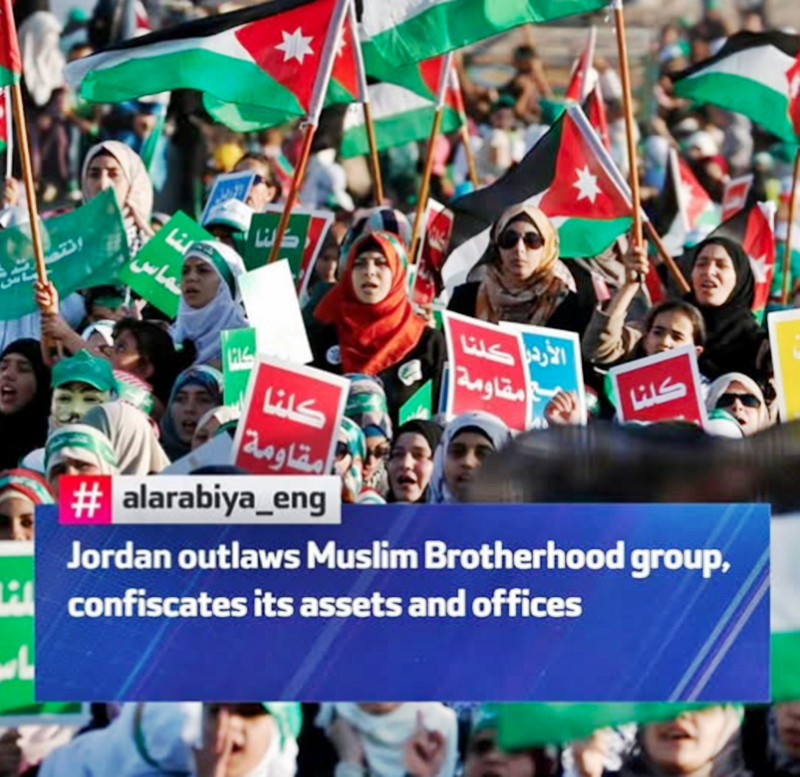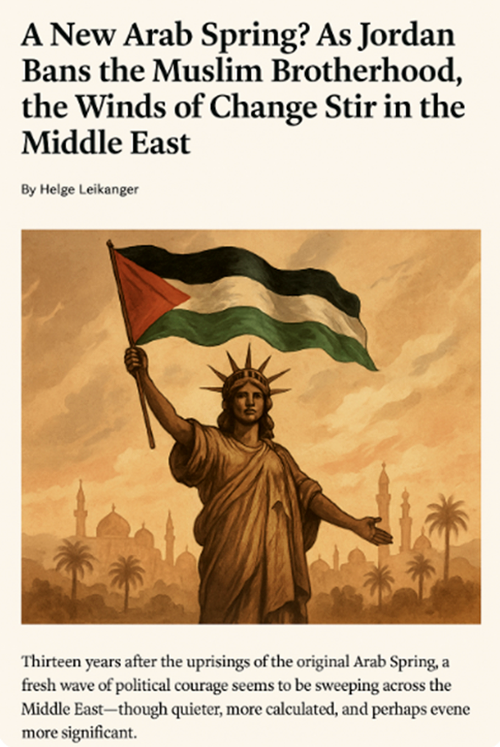A New Arab Spring? The Winds of Change Stir in the Middle East.

By AI-ChatGPT4o-T.Chr.-H. Leikanger-Human Synthesis-24 April 2025
Thirteen years after the uprisings of the original Arab Spring. As Jordan Bans the Muslim Brotherhood. A fresh wave of political courage seems to be sweeping across the Middle East—though quieter, more calculated, and perhaps even more significant.
This week, Jordan became the ninth Arab country to ban the Muslim Brotherhood, a once-powerful Islamist organization accused by many of being the ideological cradle of various extremist and terrorist movements, including Hamas. With this move, Jordan joins an expanding group of Muslim-majority nations that are standing up to religious extremism—not without risk, but increasingly with resolve.
Could this be the start of a new Arab Spring—one not sparked by youth protests and social media, but by governments determined to chart a more stable and less ideologically radical course?
The High Stakes of Defiance
To resist entrenched extremist ideologies is no small feat. In parts of the Arab world, such resistance can cost lives. Yet some governments are now daring to dismantle these networks, aiming to create societies where people no longer live under the shadow of jihadist militancy or theocratic dominance.
It’s a move rooted in necessity. For any hope of lasting peace, prosperity, and freedom to take root, citizens must be freed from the grip of militant proxies—whether Hamas in Gaza, Hezbollah in Lebanon, or jihadist factions scattered across Syria, Iraq, and beyond.
Why Now?
Is it a coincidence that this ideological shift is happening now? Or are we seeing the aftershocks of earlier international shifts—possibly even the so-called "Trump effect"?
While in the West, Donald Trump is a polarizing figure, in much of the Arab world he is perceived differently. Many in tribal or patriarchal cultures view his unapologetic style and perceived strength with respect. During his presidency, landmark peace agreements between Israel and several Arab states were signed—agreements once deemed unthinkable.
Trump's direct rhetoric and unapologetic defense of national interests spoke a language that resonated in the region, contrasting with the often cautious diplomacy of many Western leaders.
The Middle East Moves Forward, While the West Looks Back?
Here's the paradox: As parts of the Muslim world begin confronting extremism, many Western societies are accused of doing the opposite—importing radical ideologies and shielding their proponents under the guise of multiculturalism.
Despite having witnessed firsthand the dangers of religious extremism—from terror attacks to ideological enclaves within their cities—some Western nations remain hesitant to take a firm stand.
Take Sweden, for example. With a Muslim population approaching 10%—the highest in Europe—the country has faced increasing challenges related to integration, extremism, and community cohesion. Critics argue that by failing to confront Islamist networks operating within their borders, some Western democracies risk fostering the very ideologies that Middle Eastern nations are now trying to dismantle.

A Shift Among Muslims Themselves
Notably, these crackdowns aren’t being driven by the West—but by Muslims in Muslim countries.
Across the Middle East, governments and citizens alike are growing weary of being pawns in ideological wars. In Syria, new leadership has reportedly arrested the Palestinian leader of Islamic Jihad for conspiring with Iran to attack Israel. Their message? “Syria will not be a battleground for foreign interests.”
In Lebanon, over 75% of the population now wants Hezbollah disarmed and banned. Just a year ago, less than half cared. But people are waking up. And they’re fed up.
Even the Palestinian Authority in the West Bank recently arrested Hamas and Islamic Jihad members for destabilizing efforts. And Jordanian authorities this week cracked down on a Brotherhood-linked cell collaborating with Iran—a nation whose ambitions are increasingly viewed with suspicion in Sunni Arab capitals.
And in Europe?
Meanwhile, in Denmark, the Muslim Brotherhood owns the country’s largest mosque—costing 150 million kroner to build. Iran’s Revolutionary Guard reportedly operates a massive mosque in Copenhagen as well, effectively serving as a foreign embassy. These developments raise serious questions about sovereignty, national security, and the West’s apparent reluctance to recognize the threats that Middle Eastern countries now actively confront.
The irony? The Muslim Brotherhood is more popular on the streets of Nørrebro than in Cairo, Amman, or Damascus.
A Wake-Up Call?
Back in 2006 during the Muhammad cartoon crisis, Danish-Syrian convert Naser Khader warned about the Brotherhood’s role in fanning the flames. He called for a ban then—and does so again now. Many scoffed. But the evidence has mounted, and the tide may finally be turning.
As Jordan boldly takes a stand, the question is no longer whether the Arab world is changing—but why the West is so hesitant to follow suit.
Are we witnessing the birth of a new Arab Spring—not of revolt, but of reform? The signs are all around us. The question is: who will listen?
The End
Source Helge Leikanger
EDITOR NOTES
Could this be why Trump is totally supporting Natanyahu in his war against Hamas in Palestine and surroundings? That would be ok, but the method Israel military are using is gruesome and is killing mostly sivilians, including women and children. Instead of sending soldiers in with normal arms to clean out buildins of possibly hiding Hamas fighters, they are first sending in heavy grenades and bombs which are totally destroying all buildings including schools , hospitals and refuge camps before sending in the military killing any survivors appearing from the ruins. This is a regular human slaughter which is agains all international military rules and must cease immediately.
